What is a hip fracture and why are vegetarians more prone to it?
What is a hip fracture and why are vegetarians more prone to it? It's a break of the femur close to the joint between the thigh bone and the pelvis. It is a devastating injury; up to 50% of people die within one year.
Vegetarians in the United Kingdom are less likely to be obese and have a lower risk of getting cancer; and fewer cardiovascular diseases too.
But new research from the University of Leeds[1] after following nearly half a million persons for twelve years has found that they are 50% more likely to suffer from a hip fracture; that's not small beer.
"It has been estimated that 1 in 3 females and 1 in 12 men will sustain a hip fracture in their lifetime."
- BMC Family Practice[5]
What is a hip fracture?
Roughly 1 in 2 vegetarian women in the UK will fall and break a hip.
Or do their hips break and then they fall?
50% of people die within a year of having a hip fracture.
Much is made of the pain, premature death and cost to society of hip fractures; few consider the associated disability. The complete loss of a previously independent way of life can be even more devastating.
"Vegetarians face a 50% greater risk of hip fracture than meat-eaters; this translates to just 3 more per 1000 people over 10 years."
- BMC Medicine
That's a pretty low risk except for those three persons; for them it is an unmitigated disaster.
Lifestyle and hip fracture
Yet Blue Zone Adventists in Loma Linda are no more prone to hip fracture than meat-eaters; clearly it's all about lifestyle[2].
Those abiding in the 5 Blue Zone places of the world are ten times more likely to live and enjoy a busy, active lifestyle in their 90's and even 100. There are no old age homes. The elderly continue to dwell on their own or with family members; stress levels are very low.
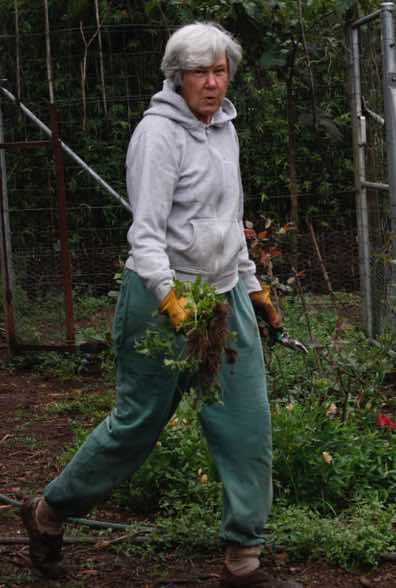
This elderly woman in her mid seventies combines walking, gardening and a plant-based diet but has no osteoporosis; she is not at risk of a hip fracture. She eats small amounts of meat, on average perhaps once a week. She lives with her husband in a cottage attached to their daughter's home. High levels of sunshine for vitamin D, food that is completely unprocessed and a low stress lifestyle mitigate against bone disease.
Yet vegetarians living in the UK are certainly more prone to hip fractures than both regular and occasional meat-eaters; and when compared to pescatarians too.
Clearly zero meat and fish intake is not friendly towards bone health; unless vegetarians make certain modifications to their lifestyles. Then they need have no additional concerns about hip fractures.
Protein and hip fracture
Researchers have long concluded that the elderly should be enjoying rather more protein to avoid frailty syndrome[3]. And that it should include all the essential amino acids; those that mammals are unable to synthesise themselves. Yet vegetarians in the UK are 17% less likely to meet these two recommendations as compared to folk eating meat.
The issues at stake are firstly the total amount of protein and secondly whether their diet includes all the essential amino acids; both are important.
Vegetarians are certainly able to get all of their protein needs from non-meat sources; but it would seem that those in the UK and perhaps universally, need to work harder at it.
Legumes, seeds and whole grains are the three main sources of protein open to vegans. For the purposes of this column we'll omit the thorny issue of dairy products. Because of their acidifying nature some still contend that milk is for babies and humans adults are the only animals that enjoy cheese.
Others believe that because the plant-based diet is very alkalising this neutralises the acidic nature of dairy products.
Legumes and hip fracture
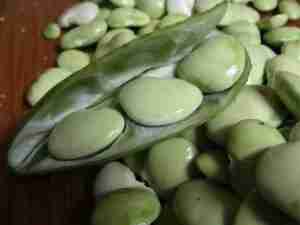 Shelled green lima beans
Shelled green lima beansRhizobia bacteria that attach to the roots of legumes live in a symbiotic relationship with the plants. They are able to extract nitrogen from the air and in return get nutrients they cannot assimilate.
The bacteria turn that nitrogen into amino acids which the plants can then utilise and store; and which animals can consume for protein. It's a complex subject obviously but for the purposes of this report we will concern ourselves with those that are eaten green or are then dried.
Green beans and peas are more palatable obviously; and have lower levels of so-called antinutrients that concern some. But they are only available year round in the temperate zones of the world; which doesn't include the United Kingdom.
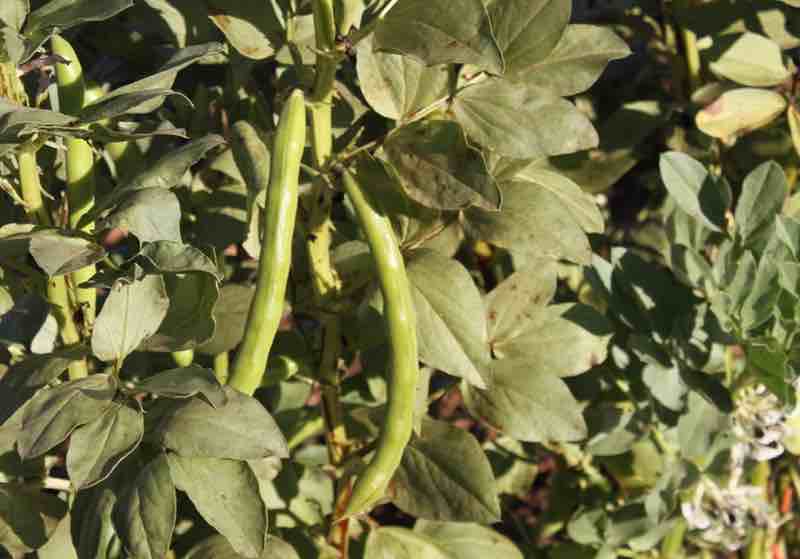 In all five Blue Zones they grow and eat broad beans
In all five Blue Zones they grow and eat broad beansThey also have to eat dried lentils, chickpeas and beans in the winter months; or those that are canned which raises other issues for those concerned about the health of both themselves and that of the planet. What is a hip fracture then becomes significant if vegetarians are reluctant to use them.
In addition legumes do not contain all the essential amino acids; in particular they are low in methionine. For this reason nutrition-conscious vegetarians enjoy a balance that includes nuts and seeds.
The exception may be the broad bean; there are reports that it contains all the essential amino acids. However you are unlikely to find them in grocery stores; and unless consumed young and freshly-harvested are perfectly horrid. You will have to grow them yourself.
Those who come from a long tradition of veganism understand these basic principles. However younger people are changing to plant-based diets either because of perceived health benefits or concerns for Mother Earth are less likely to intuitively grasp the importance of balancing their protein sources.
How to make hummus
Hummus is a nutritious condiment that ticks all the right boxes.
- Hummus delivers all the essential amino acids.
- It is simple to make at home, consisting of just four basic ingredients.
- The protein in hummus, made at home, costs one tenth of that in prime steak.
- But from the grocery store it is more expensive than meat.
Hummus is a protein-rich side dish made from a legume and a seed; chickpeas and sesame. It is usually enjoyed with whole lemon pulp, freshly roasted cumin and a herb such as parsley.
It takes only five minutes to make hummus. From the grocery store the protein costs more than steak and is usually filled with various chemicals including preservatives; it doesn't keep.
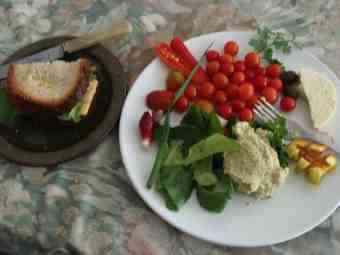
What is a hip fracture and why are vegetarians more prone to it?
Obviously no researcher could ever find a vegetarian population group that eats hummus regularly and walks daily to recommendations, so it is speculative to assume they are not more prone to hip fracture. Racquet sports and in particular tennis come up regularly in the literature too incidentally.
The take home
The take home for vegans weighing what is a hip fracture and why they are vulnerable, is that they need not be overly anxious; but they do have to accept that various lifestyle changes may be necessary. Regular walks are not too onerous and should be enjoyed by all anyway.
More difficult are other good sources of protein. What is not well understood, for example is that the bran of wheat is where the more important amino acids are to be found; they have been extracted to produce refined cake and bread flour.
But true wholemeal bread is impossible to find; you may have to mill the flour and bake it yourself.
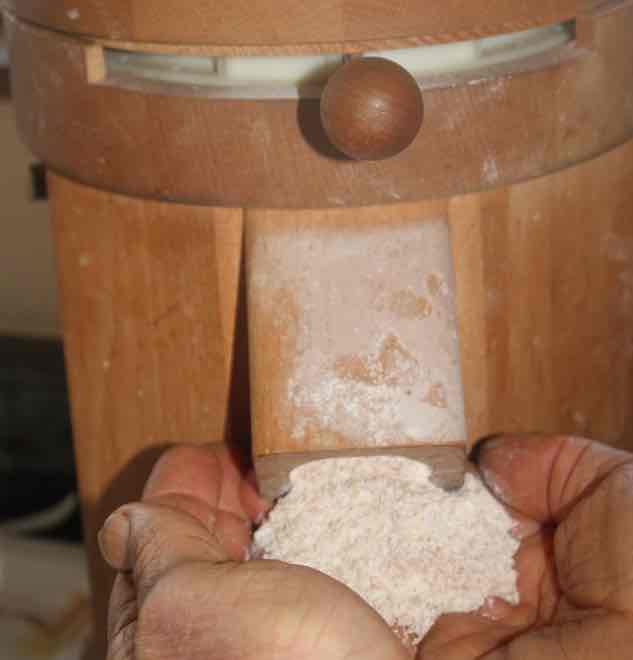
What is a hip fracture and why are vegetarians more prone to it?
Eggs and dairy products also contain all the essential amino acids. There is no reason why lacto-vegetarians should be concerned about hip fracture but good protein sources remain paramount.
Kefir and hip fracture
Kefir is a type of strong yoghurt that can easily be cultured at home; it contains a much broader spread of the vital "friendly flora." It's not recommended that we take probiotic supplements as they flood the gut with a narrow spectrum of bacteria; diversity is extremely important too.
It is the richest known source of natural calcium.
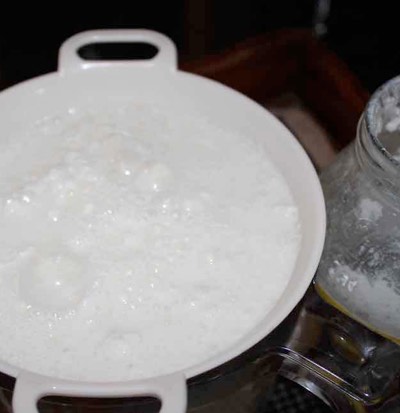 Kefir is the best source of calcium
Kefir is the best source of calciumThe material expressed on this page is gleaned from the nutritional and environmental literature; it is clearly referenced. A plain distinction is made between the author's opinion and that which is scientifically proven. When in doubt consult your health professional.
To suggest a correction or clarification, write to Dr Bernard Preston here. Contact.
What is a hip fracture and why are vegetarians more prone to it?
What is a hip fracture and why are vegetarians more prone to it? There are simple things they can do to ameliorate this scourge that causes so much pain, loss of independence and an early demise.
When browsing use right click and "Open Link in New Tab" or you may get a bad gateway signal.
Newsletter
Our newsletter is entitled "create a cyan zone" at your home, preserving both yourself and Mother Earth for future generations; and the family too, of course. We promise not to spam you with daily emails promoting various products. You may get an occasional nudge to buy one of my books.
Here are the back issues.
- Lifestyle and ideal body weight
- What are ultra-processed foods?
- Investing in long-term health
- Diseases from plastic exposure
- Intensive lifestyle management for obesity has limited value
- A world largely devoid of Parkinson's Disease
- The impact of friendly bacteria in the tum on the prevention of cancer
- There's a hole in the bucket
- Everyone is talking about weight loss drugs
- Pull the sweet tooth
- If you suffer from heartburn plant a susu
- Refined maize meal and stunting
- Should agriculture and industry get priority for water and electricity?
- Nature is calling
- Mill your own flour
- Bake your own sourdough bread
- Microplastics from our water
- Alternative types of water storage
- Wear your clothes out
- Comfort foods
- Create a bee-friendly environment
- Go to bed slightly hungry
- Keep bees
- Blue zone folk are religious
- Reduce plastic waste
- Family is important
- What can go in compost?
- Grow broad beans for longevity
- Harvest and store sunshine
- Blue zone exercise
- Harvest and store your rainwater
- Create a cyan zone at your home
Did you find this page interesting? How about forwarding it to a friendly book or food junkie? Better still, a social media tick would help.
Address:
56 Groenekloof Rd,
Hilton, KZN
South Africa
Website:
https://www.bernard-preston.com